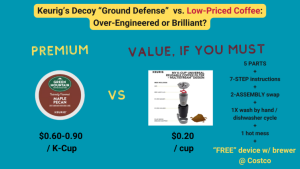Introduction
Lately, my LinkedIn feed has been persistently featuring this Alzheimer’s Association post. It calls for everyone to protest the draft decision by CMS (Centers for Medicare & Medicaid Services) to limit coverage for the Alzheimer’s drug, Aduhelm, hoping for an ultimate reversal. Nearly all of us, me included, have loved ones with Alzheimer’s. Even a basic understanding of this horrible disease triggers empathy, fear and a desire to fight for a cure. Virtually every one of us would reject discrimination, or undignified treatment for anyone with Alzheimer’s or any other life-threatening diseases. But urging our collective sympathy into supporting misguided policies with catastrophic costs to all involved is not the right way to support Alzheimer’s patients.
The Alzheimer’s Association ignores many “bad facts” that support CMS’ decision
CMS (Centers for Medicare & Medicaid Services) has issued a draft decision that would deny reimbursement for ONE Alzheimer’s drug, Biogen’s Aduhelm, and its class of peer drugs (as of yet inexistent) that target amyloid plaque with monoclonal antibodies (Aduhelm is the first of this kind). Importantly, it will allow reimbursement for patients in clinical trials (e.g. for use during the work to prove any effectiveness claims).
In doing so, it rejected a uniquely unqualified candidate, courageously standing up to the “politically touchy” implications. I have previously written about Aduhelm’s highly problematic value claims, out-of-touch pricing, and still-evolving scandal in: Biogen’s $26 Billion (and Counting) Pricing Problem and Aduhelm’s problems have only mounted since.
Aduhelm’s challenges (the short list)
To summarize a few (links to supporting information either in my original article OR here on FiercePharma.com):
- Aduhelm has significant side effects (brain swelling or bleeds) for many patients
- Some of the nation’s most prestigious medical institutions refuse to prescribe Aduhelm
- Eminent physicians have resigned from FDA advisory panels over Aduhelm’s FDA “expedited” approval
- The FDA has called for Congress to investigate its own approval of Aduhelm, acknowledging some irregularities and apparent “uniqueness” in the process
- Biogen’s own R&D head resigned (or was pushed out)
- Japan and the EU (the latter home of some of the most generous social safety net and anti-discrimination laws on the planet) also rejected reimbursement for Aduhelm
- Aduhelm’s original price tag of $56,000/year was a complete scandal and seemed utterly disconnected from experts’ evaluation of even its claimed benefits. Its value claims remain unsupported or at best inconclusive in clinical trials
- Biogen has since cut the price in half, as virtually nobody was buying it (walking the proverbial walk of shame in pricing terms, and underscoring the flimsiness of any price tag for a drug whose value is, at best, hotly questioned). There is no better argument for $28,000/year than for $56,000
- Medicare has already, preemptively, raised its monthly premium for all enrolled Americans, in anticipation of “potential” higher costs for Aduhelm
Rejecting ineffective and overpriced drugs sets a much-needed precedent, even in Alzheimer’s emotionally charged context
Unlike the FDA (which is by law required to evaluate clinical claims only), CMS must both evaluate clinical value and manage Medicare’s budget. In its own words it must, among other things:
Protect our programs' sustainability for future generations by serving as a responsible steward of public funds.
AND
Drive Innovation to tackle our health system challenges and promote value-based, person-centered care.www.CMS.gov Tweet
Rejecting Unqualified or Unaffordable Candidates Is NOT Discrimination
Rejecting ONE unqualified candidate that comes with an astronomical price tag to boot, is NOT discrimination, even if the candidate is (by and large, wrongly) characterized as relief for a long-suffering minority or disability group. CMS has made a courageous, fact-informed, and principled decision that sets an important precedent in standing up to absurd costs and questionable or even harmful drugs. CMS is doing its job, and its competence (and independence to political pressures) is the main reason Medicare remains the last “affordable” healthcare coverage in America.
Rejecting a Bad Precedent
Let’s now imagine the different kind of precedent the Alzheimer’s Association would achieve if we followed its urging and pressured CMS to reverse its decision. If every drug or device that could somehow be tied to needs of a sympathetic minority should be reimbursed, now matter how ruinous the price tag and how flimsy the evidence of any benefits, what next? We (and Medicare) would continue the inexorable march into crippling fiscal insolvency, with the gun of “discrimination” charges to our head. This Washington Post article details the size of impact from Aduhelm on Medicare premiums (and taxpayer burden to foot the other 75% of cost) that went up already in 2022.
Pharma Bro Martin Shrekli (now in prison and subject of an episode of American Greed on CNBC) would appear justified in appealing to the public too … as would the infamous maker of Epipen, Mylan … surely the patients for their insanely priced products are just as deserving of protection against “discrimination”, and Medicare should reimburse Daraprim and Epipens no matter the cost? In fact, Daraprim and Epipen would have at least one huge leg up: they are in fact highly effective treatments. Aduhelm, according to some of the nation’s most credible experts, is not.
Pricing and coverage decisions should be left to the well-informed (and preferably, independent) … e.g. CMS
Prices should be tied to value and benefits, not political pressure, advocacy groups with potential conflicts of interest, and flawed polls.
The Alzheimer’s Association details its position on CMS’ decision here. At some point, it had links to a poll conducted on its behalf that seemed to suggest majorities of Americans support Aduhelm, the reversal of the CMS decision, and reimbursement for the treatment.
Neither the Association’s position, nor the questions / background in that poll mention any of the deeply concerning facts in the bullet points above. Of course empathetic voters would like everything to be covered, and everyone suffering to find relief. So would CMS, the EU, or Japan. But it’s the CMS here that has the adult job of balancing the budget, and “some” distance from supercharged emotions. It has been doing a great job for Medicare for many years, and it should be allowed to continue without undue pressures.
Conflicts of Interest Do Not Help
The Association claims to care about lowering drug costs. Pressuring CMS to accept a ridiculous one seems incongruous. So does accepting hundreds of thousands of dollars from Biogen and Eisai, (just in 2021) who would of course reap billions if CMS reverses its decision. In fact, some of the largest donors on that list are all lined up to benefit from the “bad precedent” discussed above, with many pharma companies having their own Alzhemier’s drugs of yet unproven worthiness in the pipeline. I hope the next ad I see on LinkedIn is about how the Association used its ties and leverage with Biogen & Eisai to get the price for Aduhelm lowered by another 80%. That would put it in the $3,000-8,400 range suggested by the independent experts at ICER, who consider the economic VALUE of drugs.
I am convinced the Alzheimer’s Association does wonderful things and is an indispensable organization in uniting advocacy for fighting one of the world’s worthiest causes. It should understand the difference between advocating for something good for society as a whole (good and affordable drugs that actually help Alzheimer’s patients at a cost society can afford), and a zero sum game that unquestionably costs a bundle every single taxpayer and senior, has questionable benefits for patients, and only unquestionably benefits the pharma companies. Divesting from donations that cannot but muck up motives, or disclosing “A portion or all of this ad is paid with funds from pharma companies that will make billions if the CMS decision is reversed” could go a long way towards making us all feel respected and heard.





